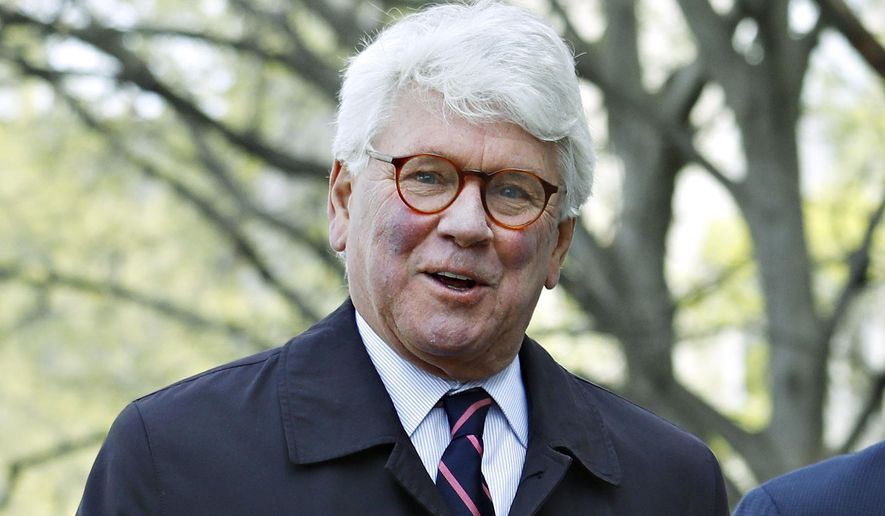Federal prosecutors opened the trial of Greg Craig on Thursday by painting the former top lawyer in the Obama White House as a man so intent on protecting his reputation that he was willing to lie about his work for a foreign government.
Mr. Craig is charged with misleading Justice Department investigators about his work for Ukrainian officials in 2012, when he prepared a report about that country’s prosecution of a prominent politician.
Assistant U.S. Attorney Molly Gaston told the courtroom Thursday that Mr. Craig’s activities should have been reported under federal law, but he concealed his work because he worried it would taint his decades-long reputation as a Washington power broker.
“Gregory B. Craig had a choice. He could tell the truth and be forthcoming when the Department of Justice asked him questions about his work for a foreign government, or he could lie and conceal,” Ms. Gaston said in a 45-minute opening statement. “We are here because the defendant chose to lie and conceal.”
She said he worried that reporting his activities could jeopardize his chances of landing a post in a future administration.
William Taylor, Mr. Craig’s defense attorney, said protecting his reputation is exactly why Mr. Craig wouldn’t lie.
He ticked off a list of accomplishments from registering blacks to vote in the South during the civil rights movement to advising both Presidents Bill Clinton and Barack Obama.
“Greg Craig has led an exemplary life,” Mr. Taylor said during an hour-and-a-half opening statement. “If there is one person whose honesty you can put your faith in, it’s Greg Craig.”
He acknowledged that if Mr. Craig had registered under the Foreign Agent Registration Act (FARA) it might have damaged his future job prospects, but he said the activities Mr. Craig engaged in didn’t rise to the level of registration.
Among the details Mr. Craig was reluctant to reveal were that his firm was paid $4 million by a Ukrainian oligarch through a Cyprus bank account to do a review of Ukraine’s prosecution of Yulia Tymoshenko, a rival of Ukraine’s pro-Russia president at the time.
That bank account was controlled by future Trump campaign chairman Paul Manafort, Ms. Gaston said.
Mr. Craig’s firm also had a deal to advise the Ukrainian government for a possible second trial of Ms. Tymoshenko, according to the prosecution. That raised questions about a possible conflict of interest and the report’s independence.
“There were aspects of the defendant’s work on the report that were not public and that he did not want to become public,” Ms. Gaston said. “The defendant’s reputation is tied up in all of this.”
After the report was completed, Mr. Craig had conversations with three journalists about it and hand-delivered a copy to New York Times reporter David Sanger. Ms. Gaston said those moves were proof he was promoting the report, which is the kind of activity he should have reported under FARA.
But Mr. Taylor said Mr. Craig was simply trying to counter efforts by the Ukrainian government to misrepresent the report’s contents as a clear vindication, contrary to how Mr. Craig saw it. He said Mr. Craig and Mr. Sanger reside near each other and have known each other for years. Mr. Craig believed the journalist would accurately represent the report.
Mr. Craig’s prosecution stemmed from special counsel Robert Mueller’s probe into links between Russia and the Trump campaign, where Manafort’s work in Ukraine was a focus.
Manafort, who is serving more than seven years in jail for financial fraud, was front and center during Thursday’s opening arguments. Ms. Gaston repeatedly mentioned his name and flashed his picture on a courtroom television in an effort to paint Mr. Craig with the same brush.
Mr. Taylor also focused on Manafort, reminding the jurors that he was a little-known lobbyist during his 2012 dealings with Mr. Craig.
“In 2012, people didn’t know things about Paul Manafort, Mr. Craig didn’t know things about Paul Manafort, that people know now,” he said.
• Jeff Mordock can be reached at jmordock@washingtontimes.com.




Please read our comment policy before commenting.